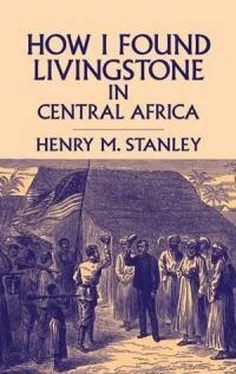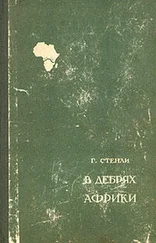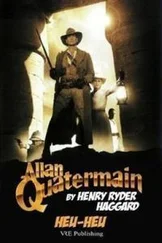Генри Стенли - How I Found Livingstone
Здесь есть возможность читать онлайн «Генри Стенли - How I Found Livingstone» весь текст электронной книги совершенно бесплатно (целиком полную версию без сокращений). В некоторых случаях можно слушать аудио, скачать через торрент в формате fb2 и присутствует краткое содержание. Год выпуска: 1872, Жанр: Биографии и Мемуары, на английском языке. Описание произведения, (предисловие) а так же отзывы посетителей доступны на портале библиотеки ЛибКат.
- Название:How I Found Livingstone
- Автор:
- Жанр:
- Год:1872
- ISBN:нет данных
- Рейтинг книги:5 / 5. Голосов: 1
-
Избранное:Добавить в избранное
- Отзывы:
-
Ваша оценка:
- 100
- 1
- 2
- 3
- 4
- 5
How I Found Livingstone: краткое содержание, описание и аннотация
Предлагаем к чтению аннотацию, описание, краткое содержание или предисловие (зависит от того, что написал сам автор книги «How I Found Livingstone»). Если вы не нашли необходимую информацию о книге — напишите в комментариях, мы постараемся отыскать её.
How I Found Livingstone — читать онлайн бесплатно полную книгу (весь текст) целиком
Ниже представлен текст книги, разбитый по страницам. Система сохранения места последней прочитанной страницы, позволяет с удобством читать онлайн бесплатно книгу «How I Found Livingstone», без необходимости каждый раз заново искать на чём Вы остановились. Поставьте закладку, и сможете в любой момент перейти на страницу, на которой закончили чтение.
Интервал:
Закладка:
Sheikh Hashid was a man of note and of wealth in Zanzibar. He had himself despatched several caravans into the interior, and was necessarily acquainted with several prominent traders who came to his house to gossip about their adventures and gains. He was also the proprietor of the large house Capt. Webb occupied; besides, he lived across the narrow street which separated his house from the Consulate. Of all men Sheikh Hashid was the man to be consulted, and he was accordingly invited to visit me at the Consulate.
From the grey-bearded and venerable-looking Sheikh, I elicited more information about African currency, the mode of procedure, the quantity and quality of stuffs I required, than I had obtained from three months' study of books upon Central Africa; and from other Arab merchants to whom the ancient Sheikh introduced me, I received most valuable suggestions and hints, which enabled me at last to organize an Expedition.
The reader must bear in mind that a traveller requires only that which is sufficient for travel and exploration that a superfluity of goods or means will prove as fatal to him as poverty of supplies. It is on this question of quality and quantity that the traveller has first to exercise his judgment and discretion.
My informants gave me to understand that for one hundred men, 10 doti, or 40 yards of cloth per diem, would suffice for food. The proper course to pursue, I found, was to purchase 2,000 doti of American sheeting, 1,000 doti of Kaniki, and 650 doti of the coloured cloths, such as Barsati, a great favourite in Unyamwezi; Sohari, taken in Ugogo; Ismahili, Taujiri, Joho, Shash, Rehani, Jamdani or Kunguru-Cutch, blue and pink. These were deemed amply sufficient for the subsistence of one hundred men for twelve months. Two years at this rate would require 4,000 doti = 16,000 yards of American sheeting; 2,000 doti = 8,000 yards of Kaniki; 1,300 doti = 5,200 yards of mixed coloured cloths. This was definite and valuable information to me, and excepting the lack of some suggestions as to the quality of the sheeting, Kaniki, and coloured cloths, I had obtained all I desired upon this point.
Second in importance to the amount of cloth required was the quantity and quality of the beads necessary. Beads, I was told, took the place of cloth currency among some tribes of the interior. One tribe preferred white to black beads, brown to yellow, red to green, green to white, and so on. Thus, in Unyamwezi, red (sami-sami) beads would readily be taken, where all other kinds would be refused; black (bubu) beads, though currency in Ugogo, were positively worthless with all other tribes; the egg (sungomazzi) beads, though valuable in Ujiji and Uguhha, would be refused in all other countries; the white (Merikani) beads though good in Ufipa, and some parts of Usagara and Ugogo, would certainly be despised in Useguhha and Ukonongo. Such being the case, I was obliged to study closely, and calculate the probable stay of an expedition in the several countries, so as to be sure to provide a sufficiency of each kind, and guard against any great overplus. Burton and Speke, for instance, were obliged to throw away as worthless several hundred fundo of beads.
For example, supposing the several nations of Europe had each its own currency, without the means of exchange, and supposing a man was about to travel through Europe on foot, before starting he would be apt to calculate how many days it would take him to travel through France; how many through Prussia, Austria, and Russia, then to reckon the expense he would be likely to incur per day. If the expense be set down at a napoleon per day, and his journey through France would occupy thirty days, the sum required forgoing and returning might be properly set down at sixty napoleons, in which case, napoleons not being current money in Prussia, Austria, or Russia, it would be utterly useless for him to burden himself with the weight of a couple of thousand napoleons in gold.
My anxiety on this point was most excruciating. Over and over I studied the hard names and measures, conned again and again the polysyllables; hoping to be able to arrive some time at an intelligible definition of the terms. I revolved in my mind the words Mukunguru, Ghulabio, Sungomazzi, Kadunduguru, Mutunda, Samisami, Bubu, Merikani, Hafde, Lunghio-Rega, and Lakhio, until I was fairly beside myself. Finally, however, I came to the conclusion that if I reckoned my requirements at fifty khete, or five fundo per day, for two years, and if I purchased only eleven varieties, I might consider myself safe enough. The purchase was accordingly made, and twenty-two sacks of the best species were packed and brought to Capt. Webb's house, ready for transportation to Bagamoyo.
After the beads came the wire question. I discovered, after considerable trouble, that Nos. 5 and 6-almost of the thickness of telegraph wire-were considered the best numbers for trading purposes. While beads stand for copper coins in Africa, cloth measures for silver; wire is reckoned as gold in the countries beyond the Tan-ga-ni-ka.* Ten frasilah, or 350 lbs., of brass-wire, my Arab adviser thought, would be ample. _________________ * It will be seen that I differ from Capt. Burton in the spelling of this word, as I deem the letter " y " superfluous. ________________
Having purchased the cloth, the beads, and the wire, it was with no little pride that I surveyed the comely bales and packages lying piled up, row above row, in Capt. Webb's capacious store-room. Yet my work was not ended, it was but beginning; there were provisions, cooking-utensils, boats, rope, twine, tents, donkeys, saddles, bagging, canvas, tar, needles, tools, ammunition, guns, equipments, hatchets, medicines, bedding, presents for chiefs-in short, a thousand things not yet purchased. The ordeal of chaffering and — haggling with steel-hearted Banyans, Hindis, Arabs, and half-castes was most trying. For instance, I purchased twenty-two donkeys at Zanzibar. $40 and $50 were asked, which I had to reduce to $15 or $20 by an infinite amount of argument worthy, I think, of a nobler cause. As was my experience with the ass-dealers so was it with the petty merchants; even a paper of pins was not purchased without a five per cent. reduction from the price demanded, involving, of course, a loss of much time and patience.
After collecting the donkeys, I discovered there were no pack-saddles to be obtained in Zanzibar. Donkeys without pack-saddles were of no use whatever. I invented a saddle to be manufactured by myself and my white man Farquhar, wholly from canvas, rope, and cotton.
Three or four frasilahs of cotton, and ten bolts of canvas were required for the saddles. A specimen saddle was made by myself in order to test its efficiency. A donkey was taken and saddled, and a load of 140 lbs. was fastened to it, and though the animal-a wild creature of Unyamwezi-struggled and reared frantic ally, not a particle gave way. After this experiment, Farquhar was set to work to manufacture twenty-one more after the same pattern. Woollen pads were also purchased to protect the animals from being galled. It ought to be mentioned here, perhaps, that the idea of such a saddle as I manufactured, was first derived from the Otago saddle, in use among the transport-trains of the English army in Abyssinia.
A man named John William Shaw-a native of London, England, lately third-mate of the American ship `Nevada'-applied to me for work. Though his discharge from the `Nevada' was rather suspicious, yet he possessed all the requirements of such a man as I needed, and was an experienced hand with the palm and needle, could cut canvas to fit anything, was a pretty good navigator, ready and willing, so far as his professions went.. I saw no reason to refuse his services, and he was accordingly engaged at $300 per annum, to rank second to William L. Farquhar. Farquhar was a capital navigator and excellent mathematician; was strong, energetic, and clever.
Читать дальшеИнтервал:
Закладка:
Похожие книги на «How I Found Livingstone»
Представляем Вашему вниманию похожие книги на «How I Found Livingstone» списком для выбора. Мы отобрали схожую по названию и смыслу литературу в надежде предоставить читателям больше вариантов отыскать новые, интересные, ещё непрочитанные произведения.
Обсуждение, отзывы о книге «How I Found Livingstone» и просто собственные мнения читателей. Оставьте ваши комментарии, напишите, что Вы думаете о произведении, его смысле или главных героях. Укажите что конкретно понравилось, а что нет, и почему Вы так считаете.












